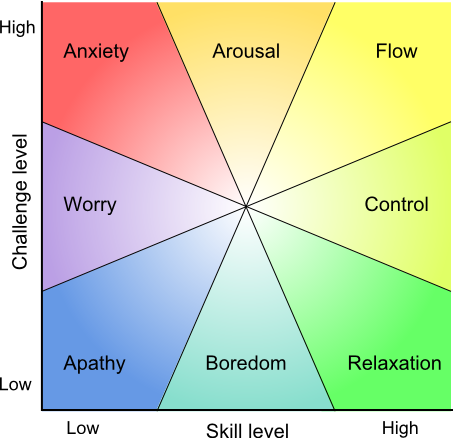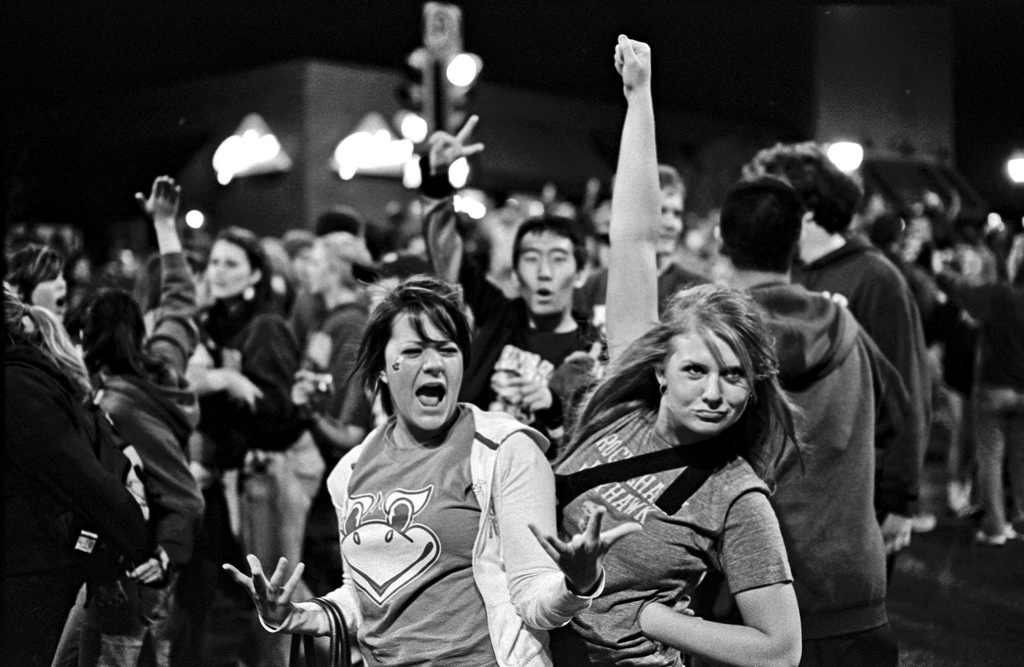Have you ever become completely engaged in your favorite activity? Lost track of time? Felt focused, energized, and completely unselfconscious? As if your body and mind were working in perfect harmony?
If so, you may have experienced something by described by the renowned professor Mihaly Csikszentmihalyi as the Flow state. In his book Flow: The Psychology of Optimum Experience, CM explains what Flow is, when people experience it, and why it’s so important.
Athletes call this ‘being in the zone.’ Buddhists might call this simply mindfulness or low-level nirvana. The Greeks would describe this as being taken over by the muse.
Whenever you see an amazing performance or creation, it’s a safe bet to assume the performer or creator was experiencing flow.
Why is Flow Important?
According to Csikszentmihalyi, once a person achieves a certain level of income (maybe $35,000 US/year), their happiness levels are about the same as people who make $300,000/year. What does this mean?
Making more money doesn’t make people happier. Owning more stuff doesn’t make people happier.
Experiencing Flow makes people happier.
Experiencing flow will not only make you happier, but it will improve the quality of your work. Writers say the work they produce while in the Flow state is some of their best. People who perform together like athletes and musicians spend a lot of time talking about chemistry. Why? Because good chemistry leads to more frequent Flow in groups. This leads to better overall performance.
What is Flow?
Flow is attention. Total and complete attention. Or, in Csikszentmihalyi’s words, Flow is:
“being completely involved in an activity for its own sake. The ego falls away. Time flies. Every action, movement, and thought follows inevitably from the previous one, like playing jazz. Your whole being is involved, and you’re using your skills to the utmost.”
Other characteristics of flow include:
- Feeling energized, focused, engrossed, and unselfconscious
- Experiencing great clarity, engagement, and total immersion
- Being blissfully ignorant of things like hunger and fatigue
When do People Experience Flow?
Everything I’ve read suggests that most people find flow while doing one of two things: hobbies they love or working at their job. The latter is a little surprising, as a lot of people will tell you they don’t like their job. Jobs, though, have all several of the components required for flow: a rule-based system, feedback, clear and definable goals.
A person is most likely to find flow while engaged in an activity where the challenges match the skill level. During low-challenge activities, people become bored. If an activity is too challenging, they experience worry and anxiety. The chart below describes when people are most likely to experience flow.

Besides doing hobbies and activities, many people find Flow in social situations. Why? Conversation and social interactions have definite rules, they provide immediate feedback, and they’re rewarding for their own sake.
Other flow-inducing activities include creating music and art, writing, writing code and building websites, playing sports, learning and studying, reading, watching good movies, playing chess and other board games, building things, traveling, climbing and abseiling/rapelling, skiing, surfing…this list could keep going.
Video games seem to be designed with flow in mind. People have written papers on such things. Jenove Chen, for example. Why are games so likely to help people find flow? They have all the attributes required for finding flow: a system with clear rules, immediate feedback (scores), goal-based challenges. They also require full concentration, engagement, and a certain amount of skill.
Finally, people rarely experience flow during passive recreation. Csikszentmihalyi cites a German study that found people who read more books reported more frequent flow experiences. On the other hand, the more television a person watched, the less likely they were to experience flow. Why? Television is a passive medium. Watching requires little skill and provides no challenge. Plus, commercials destroy concentration.
Tips for Finding Flow
Finding flow can take some work. I wish there were a magic button you could push. But, as they say, wish in one hand… Regardless, here are a few tips from my own experience that you might find useful.
- Ensure that an activity challenges you and engages your interests.
- Have clear goals. If you know exactly what you want, your mind will help you get it.
- Engage all your senses. One painter (I’ve lost the source) said sniffing a painting helped.
- Create a comfortable environment.
- Forgot about other people. Forget about other activities. Forget about failure.
- Use background music. For me, lyrics are distracting, so I stick with jazz, classical, and some jam bands.
- Eliminate all distractions. This could be other people, cell phones, email, whatever.
- Look and listen for feedback.
- Put in adequate time to learn the required skills. Most challenging activities have a learning curve.
Further Reading
- The book Flow: The Psychology of Optimal Experience by Mihaly Csikszentmihalyi.
- Wikipedia entry on Flow. Plenty of good resources at the end of this entry.
- Article from Psychology Today called Finding Flow by Mihaly Csikszentmihalyi.
- Solving Procrastination Using Flow by Kevin Chiu.
Over to You:
- Where do you find Flow?
- Do you have any tips for finding flow? Are there meta-skills for entering flow?
- Any meditation or Zen practitioner out there? What’s your take on this concept?
If you enjoyed this post, please subscribe to Happenchance
Flow diagram credit: Dr. Enh
Photo credit: morphomir


Comments on this entry are closed.
I have been intrigued with the concept of flow since first reading about it in Jonathan Fields’ book about a year ago. Great info in your post here, but as always, a picture is worth a thousand words. Your colorful chart is great – I just looked at it and applied different things I do in my life to it. One of my huge ongoing goals is to do more things (I have specifics) that get me to the state of flow. I’ll check out some of these resources. Thanks.
Hey Hugh,
Thanks for reading. I did the same thing and found that I could make some activities, the ones that fall on the boredom and apathy end, more interesting. Sometimes I’ll just do them differently, other times I’ll set a time goal. This usually doesn’t work, but a couple times it has. Maybe with more practice…It’s always interesting to find flow in places we don’t expect it.
Also, the chart is lovely, and I wish I could take credit for it, but that goes to the wikipedia user Dr. Enh…whoever he or she is.
Nice article, Seth! I’ve started reading more about flow recently and it really is a great and powerful state. I noticed that I get into the flow far more often when I work on my own terms, without distractions and alone.
I also found that music increases my chances of getting into this productive state of mind. I often listen to classical music, ambience or minimalism.
I’ve seen the chart in other form in a game design book, it’s great. I guess one of the keys to getting into the flow is to set increasingly bigger goals as we improve our skills.
Seth,
Thanks for this reminder. Mihaly’s book is one of my favorites. @TweetRightBrain
SETH~ Your article is amazing, logical and creative! I have read numerous books on Positive Thinking. For me, Csikszentmihalyi’s
book “The Psychology of Optimum Experience” puts a new spin on
this concept.
I have always loved music (progressive or classic progressive or classic rock/jazz/contemporary standards and poetry. I sing and I write for my own satisfaction.
I see flow as a deliberate desire to connect to our inner energy
via the medium(s) of our choice. Being in our element or in our zone
is critical to the success of this process and of our desires.
I’m reading your articles for often for personal enrichment.
Can’t wait to read the next one! ~RITA
Seth: This may your finest post yet!
I wanted to add something to the $35k vs. $300k income range and happiness. I think another important factor is how many hours you’re working – 20, 40, 60? – to achieve an income of $35k. Having time set aside to pursue activities that you enjoy is very important. Of course, if your favorite hobby and occupation happen to be the same, you have the best of both worlds. I guess I’m stating the obvious, here.
I think I’ve probably experienced Flow from a variety of activities – everything from writing to running an oven in a pizza restaurant during the rush.
Wow this is a great resource.. I’m enjoying it.. good article
Thanks Mr. Seth. I started reading your articles weeks ago and every time I read an article of yours, I get motivated.